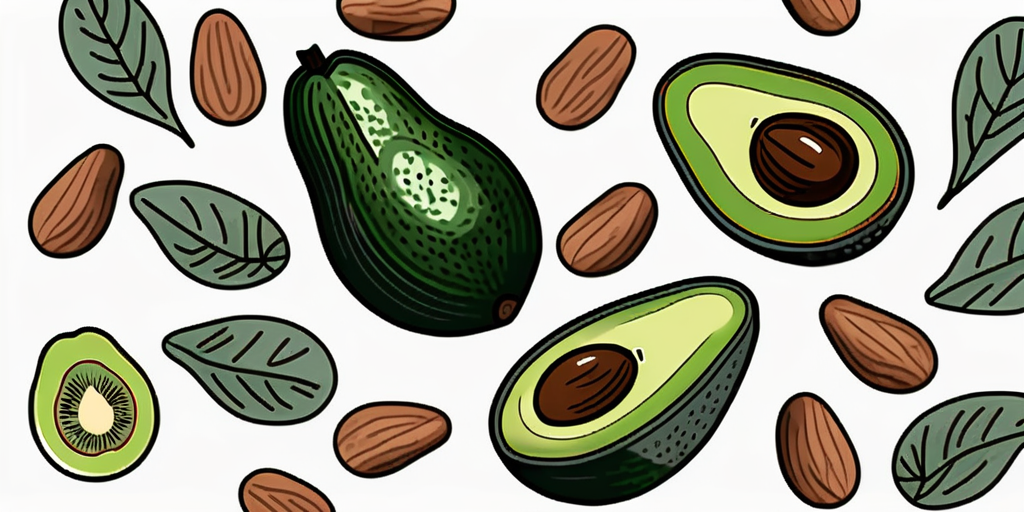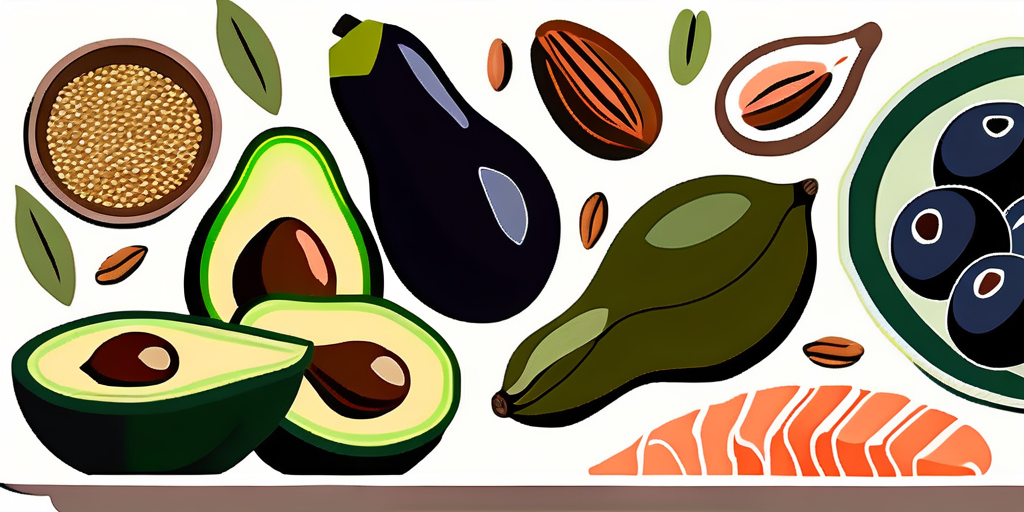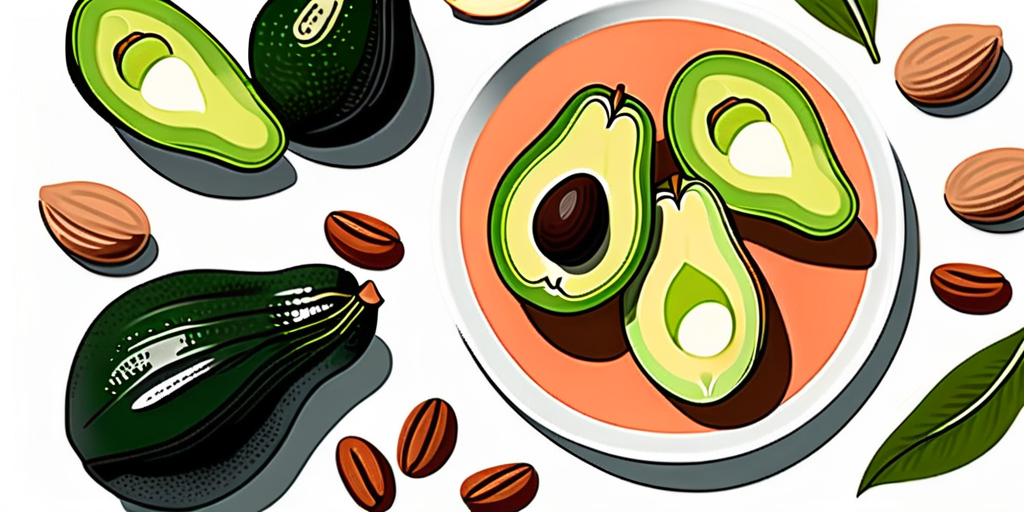Everyone knows that a healthy diet is essential for overall well-being. But when it comes to fats, there seems to be quite a bit of confusion. Are fats good or bad for us? Which types of fats should we include in our diet? In this article, we will delve into the topic of healthy fats and explore the top choices you should be incorporating into your daily meals.
Understanding the Importance of Healthy Fats
Fats play a crucial role in our body. Contrary to popular belief, not all fats are harmful. In fact, healthy fats are essential for our body to function properly. They provide energy, support cell growth, and help our body absorb important vitamins. Additionally, they contribute to maintaining healthy skin, promoting brain health, and reducing inflammation.

When it comes to healthy fats, there are several types that are beneficial for our overall well-being. Monounsaturated fats, found in foods like avocados, nuts, and olive oil, can help lower bad cholesterol levels and reduce the risk of heart disease. Polyunsaturated fats, found in fatty fish, walnuts, and flaxseeds, are rich in omega-3 fatty acids, which are important for brain function and heart health.
The Role of Fats in Our Body
Fats, also known as lipids, are a concentrated source of energy. They help insulate our body, protecting our organs and maintaining body temperature. Fats are also involved in hormone production, assisting in the regulation of metabolic processes. Furthermore, certain essential fats contribute to the proper functioning of the nervous system.
Our body needs a certain amount of fat to function optimally. However, it's important to note that not all fats are created equal. Saturated fats, found in foods like red meat, butter, and full-fat dairy products, can raise bad cholesterol levels and increase the risk of heart disease. Trans fats, found in processed and fried foods, are even more harmful and should be avoided as much as possible.
Debunking the Myths Around Fats
There are many misconceptions surrounding fats. One common myth is that all fats are unhealthy and should be avoided. While it's true that certain types of fats can be detrimental to our health, others are actually beneficial and necessary for optimal bodily function. The key is to make informed choices and incorporate the right fats into our diet.
Another myth is that eating fat makes you fat. In reality, weight gain is more closely related to consuming excess calories from any source, not just fats. It's important to maintain a balanced diet and watch our overall calorie intake to maintain a healthy weight.
Understanding the different types of fats and their effects on our body is crucial for making informed dietary choices. By incorporating healthy fats into our meals, we can support our overall health and well-being. So, next time you hear someone demonizing all fats, remember that not all fats are created equal, and some are actually essential for a healthy lifestyle.
Different Types of Fats
Before we dive into the healthy fats, it's important to understand the different types of fats that exist. Fats are an essential part of our diet, providing us with energy and helping our bodies absorb certain vitamins. However, not all fats are created equal, and some can have negative effects on our health.
Saturated Fats
Saturated fats are commonly found in animal-based products such as fatty meats, butter, and full-fat dairy. These fats have long been associated with an increased risk of heart disease, so it's best to consume them in moderation. While saturated fats have been demonized in the past, recent research suggests that their impact on heart health may not be as significant as once thought. However, it's still recommended to limit your intake of saturated fats and opt for healthier alternatives whenever possible.
When consumed in excess, saturated fats can raise levels of LDL cholesterol, also known as "bad" cholesterol, in the blood. High levels of LDL cholesterol can contribute to the development of atherosclerosis, a condition where fatty deposits build up in the arteries, restricting blood flow and increasing the risk of heart disease and stroke. It's important to note that not all saturated fats are created equal. Some sources, like coconut oil, may have a different impact on cholesterol levels compared to others.
Unsaturated Fats
Unsaturated fats, on the other hand, are considered heart-healthy fats. They can be found in foods like avocados, nuts, and olive oil. Unlike saturated fats, unsaturated fats have been shown to help lower LDL cholesterol levels and reduce the risk of heart disease when consumed in moderation. They are a great choice for a healthy diet.
There are two main types of unsaturated fats: monounsaturated fats and polyunsaturated fats. Monounsaturated fats can be found in foods like olive oil, avocados, and nuts. They are known to help improve insulin sensitivity and reduce inflammation in the body. Polyunsaturated fats, on the other hand, are found in foods like fatty fish, walnuts, and flaxseeds. They are rich in omega-3 and omega-6 fatty acids, which are essential for brain function and heart health.
Trans Fats
Trans fats are artificially created through a process called hydrogenation. They are primarily found in processed foods such as fried foods, baked goods, and margarine. Trans fats increase the shelf life of these products but are extremely harmful to our health. In fact, trans fats are considered the worst type of fat for our bodies.
When consumed, trans fats raise LDL cholesterol levels and lower HDL cholesterol levels, also known as "good" cholesterol. This imbalance in cholesterol levels increases the risk of heart disease and stroke. Additionally, trans fats promote inflammation in the body, which can contribute to various health issues, including insulin resistance, obesity, and liver damage.
Due to the well-documented negative effects of trans fats on health, many countries have implemented regulations to limit or ban their use in food production. It's important to read food labels carefully and avoid products that contain trans fats.
In conclusion, understanding the different types of fats is crucial for making informed dietary choices. While saturated fats should be consumed in moderation, unsaturated fats should be embraced as part of a healthy diet. Trans fats, on the other hand, should be avoided at all costs due to their detrimental effects on our health. By choosing healthier fats and incorporating them into a balanced diet, we can support our overall well-being and reduce the risk of chronic diseases.
The Top Healthy Fats You Should Be Eating
Now that we understand the different types of fats, let's explore the top choices you should incorporate into your diet for optimal health.

When it comes to healthy fats, avocados are a superstar. Not only are they delicious, but they are also packed with monounsaturated fats. These healthy fats help lower bad cholesterol levels, promote heart health, and reduce inflammation. Avocados are also rich in vitamins and minerals, making them a fantastic addition to any meal or snack. Whether you enjoy them mashed on toast or sliced in a salad, avocados are a versatile and nutritious choice.
Avocados and Their Benefits
Avocados are not only delicious but also packed with healthy fats. They contain monounsaturated fats, which help lower bad cholesterol levels, promote heart health, and reduce inflammation. Avocados are also rich in vitamins and minerals, making them a fantastic addition to any meal or snack.
Another excellent source of healthy fats is fatty fish. Salmon, mackerel, and sardines are all examples of fatty fish that are loaded with omega-3 fatty acids. These essential fats provide numerous health benefits, including reducing inflammation, improving brain function, and supporting heart health. Including fatty fish in your diet at least twice a week can have a significant positive impact on your overall well-being. So, next time you're planning your meals, consider adding some delicious grilled salmon or sardines to the menu.
The Power of Omega-3 in Fish
Fatty fish such as salmon, mackerel, and sardines are excellent sources of omega-3 fatty acids. Omega-3s are essential fats that provide numerous health benefits, including reducing inflammation, improving brain function, and supporting heart health. Including fatty fish in your diet at least twice a week can have a significant positive impact on your overall well-being.
Nuts and seeds are not only tasty but also rich in healthy fats. Almonds, walnuts, chia seeds, and flaxseeds are great sources of omega-3 fatty acids and other essential nutrients. Including a handful of nuts or seeds as a snack or adding them to salads and smoothies can provide a satisfying crunch and a myriad of health benefits. So, the next time you're feeling peckish, reach for a handful of almonds or sprinkle some chia seeds on your yogurt for a nutritious and delicious treat.
The Goodness of Nuts and Seeds
Nuts and seeds are not only tasty but also rich in healthy fats. Almonds, walnuts, chia seeds, and flaxseeds are great sources of omega-3 fatty acids and other essential nutrients. Including a handful of nuts or seeds as a snack or adding them to salads and smoothies can provide a satisfying crunch and a myriad of health benefits.
Another healthy fat that deserves a spot in your kitchen is olive oil. A staple in Mediterranean cuisine, olive oil is an excellent source of monounsaturated fats and contains powerful antioxidants. Regular consumption of olive oil has been linked to a reduced risk of heart disease, stroke, and certain types of cancer. So, next time you're preparing a salad or sautéing vegetables, reach for the bottle of olive oil and enjoy its delicious flavor and health benefits.
The Essential Fats in Olive Oil
Olive oil is a staple in Mediterranean cuisine and for a good reason. It is an excellent source of monounsaturated fats and contains powerful antioxidants. Regular consumption of olive oil has been linked to a reduced risk of heart disease, stroke, and certain types of cancer. Use olive oil as a dressing or for light cooking to reap its benefits.
By incorporating these top healthy fats into your diet, you can nourish your body and support your overall well-being. So, don't be afraid to add some avocados, fatty fish, nuts, seeds, and olive oil to your meals. Your taste buds and your body will thank you!
How to Incorporate Healthy Fats into Your Diet
Now that we know the top choices for healthy fats, let's explore how to incorporate them into your diet.

When it comes to maintaining a balanced diet, it's important to include a variety of foods rich in healthy fats. This not only adds flavor and texture to your meals but also provides essential nutrients for your body. One delicious and nutritious lunch option is to prepare a salad with a mix of leafy greens, creamy avocado, and a drizzle of extra virgin olive oil. The combination of these healthy fats creates a satisfying and filling meal that will keep you energized throughout the day.
For dinner, consider incorporating fatty fish into your rotation. Fish such as salmon, mackerel, and sardines are not only excellent sources of healthy fats but also provide omega-3 fatty acids, which are known for their numerous health benefits. Grilling or baking the fish with a sprinkle of herbs and a squeeze of lemon creates a mouthwatering dish that is both nutritious and flavorful.
When it comes to snacking, the possibilities for incorporating healthy fats are endless. One idea is to make a batch of homemade trail mix with your favorite nuts, seeds, and a sprinkle of dark chocolate. This combination provides a satisfying and nutritious pick-me-up, perfect for those mid-afternoon cravings. Another snack idea is to spread almond butter on whole-grain toast. The creamy texture of the almond butter combined with the crunchiness of the toast creates a delightful snack that is packed with healthy fats and fiber.
If you're looking for a savory snack, try dipping carrot sticks into hummus made with olive oil. Hummus is not only a delicious and creamy dip, but it also provides a good amount of healthy fats and protein. The addition of olive oil enhances the flavor and adds an extra dose of monounsaturated fats, which are known for their heart-healthy benefits.
When it comes to cooking, it's important to choose healthy fats that can withstand high temperatures. Oils such as olive oil and avocado oil have high smoke points, making them suitable for various cooking methods like sautéing, roasting, and stir-frying. These oils not only add flavor to your dishes but also provide a source of healthy fats that can benefit your overall health. Experiment with different herbs and spices to add flavor to your dishes while benefiting from the goodness of healthy fats.
Incorporating healthy fats into your diet is not only easy but also delicious. By including a variety of foods rich in healthy fats in your meal planning, snacking, and cooking, you can enjoy the numerous health benefits while satisfying your taste buds.
Incorporate Healthy Fats for Optimal Health
Healthy fats are an essential part of a balanced diet and should not be feared. By understanding the different types of fats and incorporating the top choices into your meals, you can reap the benefits of improved heart health, brain function, and overall well-being. Embrace the power of healthy fats and make them a cornerstone of your dietary choices.





